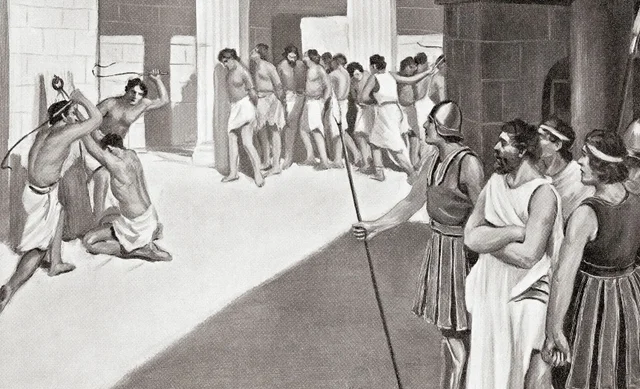Sparta was a powerful Greek state in ancient times. Slavery was an accepted norm in this region, as it was throughout the country. However, there were some differences between the lives of slaves in Sparta and those in other Greek states. But did you know they would annually declare war on their slaves?
Spartan magistrates would declare war on their slaves yearly, allowing them to harm or kill them.
The Helots
The Spartans conquered Messenia, a fertile agricultural region west of Laconia. Messenians worked in their own fields but were slaves to the Spartans. They had no political rights, and their oppressors could execute them without a trial. They were known as helots, a word of uncertain origin most likely related to a Greek verb meaning to capture. (Source: Wondrium Daily)
The Rebels
It is believed that the helots outnumbered their masters in Sparta. This was a significant distinction between the helots and other Greek slaves. Although there is no information on the exact number of helots, some experts estimate that the helot population is seven times that of the masters. The masters always feared the helots rebelling, so they avoided involving them in long foreign wars.
The fact that the helots were ethnically homogeneous had a collective identity, and worshiped their own gods made the Spartans paranoid. Their fear was heightened because their way of life relied on slaves more than any other Greek community at the time. Helots did the majority of Spartan farming. (Source: Wondrium Daily)
The Spartans’ fears were realized to be correct. The helots revolted in 464 B.C. The Spartans could not put them down for another five years. This was the only known slave rebellion in the Greek states, as far as we know.
We should not forget that Athens, and Greece in general, could not have achieved such significant cultural achievements without slavery. According to Herodotus, approximately 35,000 slaves served as light-armed forces at the Battle of Plataea in 479 BC. After this battle, the Persians were forced to flee Greece. Greece could not have defeated the barbarians without the assistance of oppressed enslaved people. It is not an exaggeration to say that slaves were unsung heroes in ancient Greece. (Source: Wondrium Daily)
Controlling the Helots
The masters, on the other hand, knew how to keep the helots under control. A group called krupteia, secret or covert, was formed to terrorize the helots. This group consisted of Spartan youths aged 18 to 20, whose primary mission was to commit random acts of violence against the helots.
When the population of Spartan citizens declined, as it did from 450 B.C, from then on, the Spartan Assembly granted slaves some freedom. However, these acts of kindness could not have been relied on all the time. The Spartans once honored the helots who had performed brave acts on their behalf. When they gathered to be honored, the Spartans slaughtered them all because they believed they were too dangerous and that it was far safer to kill them. (Source: Wondrium Daily)
Image from Reddit
